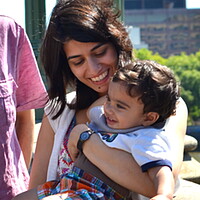Norway and paternity leave: Father's day of a different kind
Loading...
| Oslo
During my first six months in Norway I noticed that something very peculiar was going on.
It was before my son had a place in day care and we used to go out nearly every day to a playgroup or kiddie center. I got to know a Norwegian named Jeanette and her 6-month-old daughter Agniete. We ran into each other a few times a week and would swap war stories of early parenthood while our kids played.
And that’s when it happened – Jeanette disappeared.
I was at one of our usual playgroups and saw Agniete, but her mom was nowhere. Instead Agniete was scooting happily back to a man in his mid-30’s. He was too well-dressed to be a nanny and too doting to be a waif uncle. After I ran into him several times, we finally spoke, and it turns out he is Agniete’s dad, Tom.
Tom was on pappa permisjon, or paternity leave. He said that his wife had taken six months of her maternity leave but then went back to work for a few months to get things in order, while he stepped in to take care of Agniete. Three months later Jeanette was back home to finish what was left of her mamma permisjon.
The peculiar thing that I had witnessed was the men's rights movement in Norway.
By placing equal responsibilities on men and women, traditional gender roles have been progressively redefined.
Nov. 11 was Father’s Day in Norway which in this part of the world is more than just a celebration of dads who teach kids to throw a football. That morning, I made my husband fresh scones to celebrate not only his role as a father, but his rights as a man.
That’s right, I’m celebrating the freedom my husband has as a man living in Norway, which give him the right to:
- leave the office by 5:30 p.m. to spend time with his family (barring the occasional deadline)
- adjust his office hours around day-care pickup/dropoff
- have time to organize family dinners and help with housework
The Norwegian government has socially engineered a society where men and women are expected to have equal domestic and economic responsibilities. Walk around the streets of Oslo on a weekday morning and you’ll see proof: there are dads everywhere. Equipped with babybags, strollers or babycarriers, you’ll find them in coffee shops or at playgroups singing nursery rhymes.
Redistributing familial duties is simple: excellent work-to-life balance and superb parental benefits, which include a quota for fathers.
The Norwegian government spends 16 billion kroner ($2.8 billion) a year on parental benefits for a sparse population of 5 million. Here’s a breakdown of what that buys:
- Parents share time off which is either 47 weeks off of work with 100 percent pay or 57 weeks off with 80 percent pay
- The first six weeks are just for the mother, for obvious medical reasons
- Of the total paid time off shared between parents, 14 weeks are reserved exclusively for the father. If he doesn’t claim this, both parents lose this share of the parental benefits.
The government very clearly states that the paternity quota, established nearly 20 years ago, is designed to encourage men to share the role of caregiver at home.
RELATED: 5 top childcare solutions - costs and value, from nanny to day care
Last year when my then 18-month-old son had the flu, my husband’s boss heard that I was heading to the doctor and insisted that he drop everything and go to the appointment too. I was surprised by this; it was just the flu after all. But his boss appreciated that we were new to Norway and that a little extra support in the early days would go a long way. It was an example of a radically different attitude about employee welfare.






